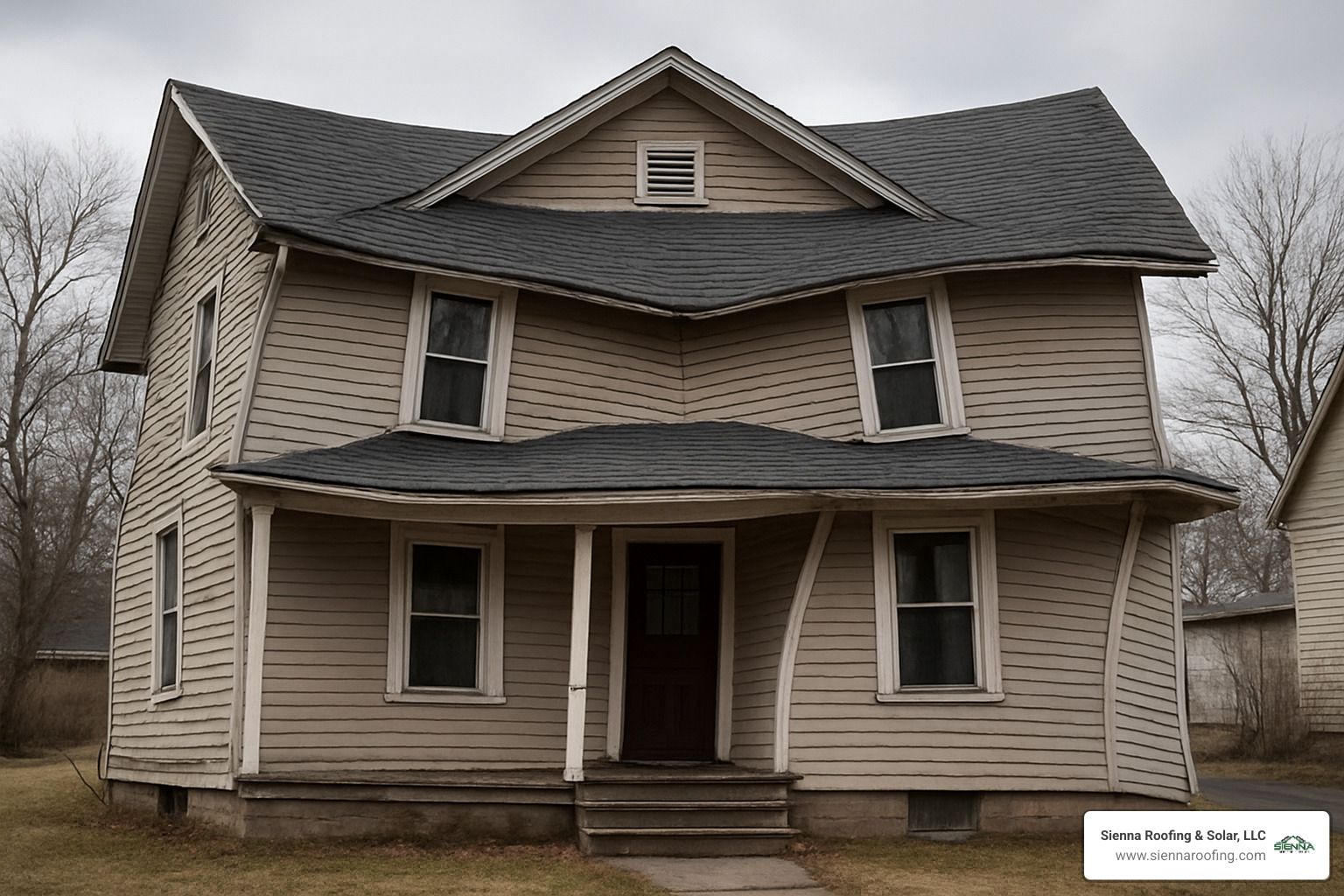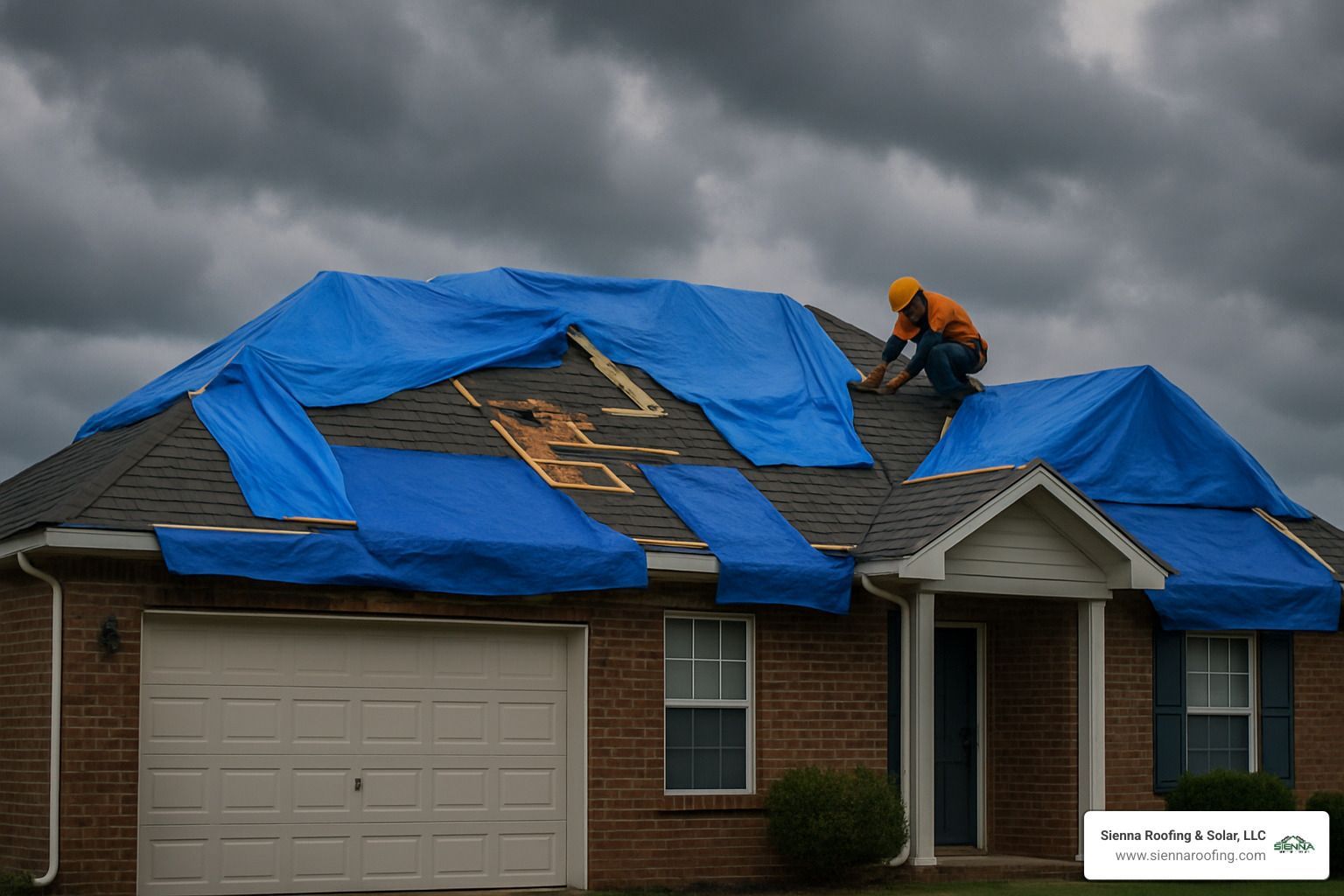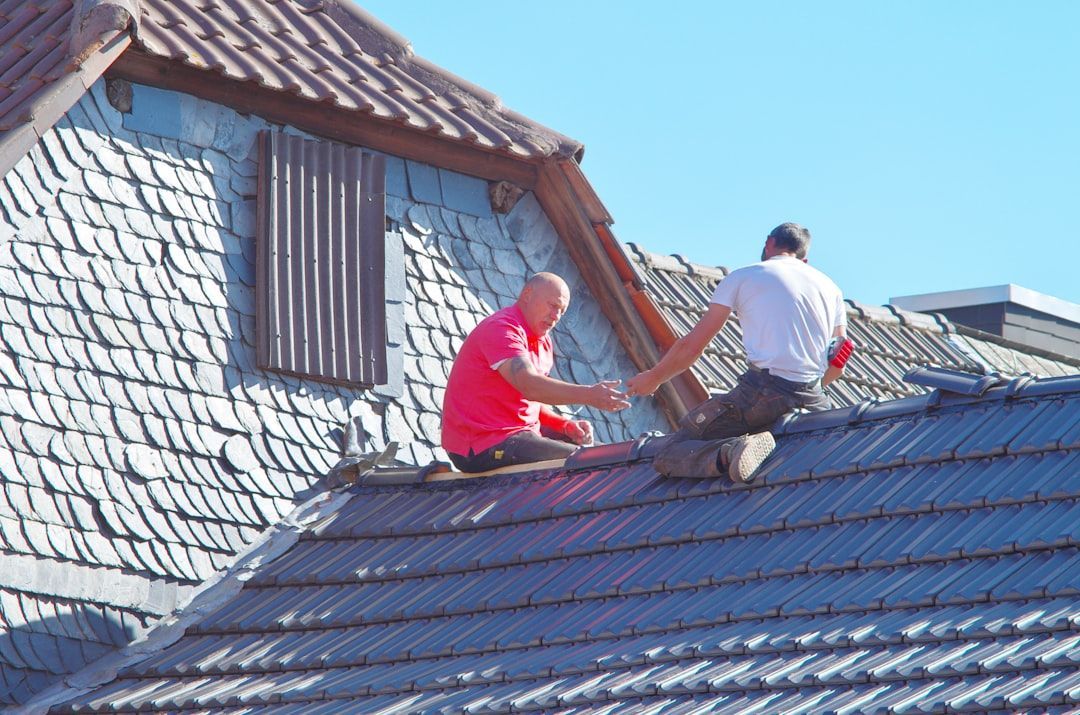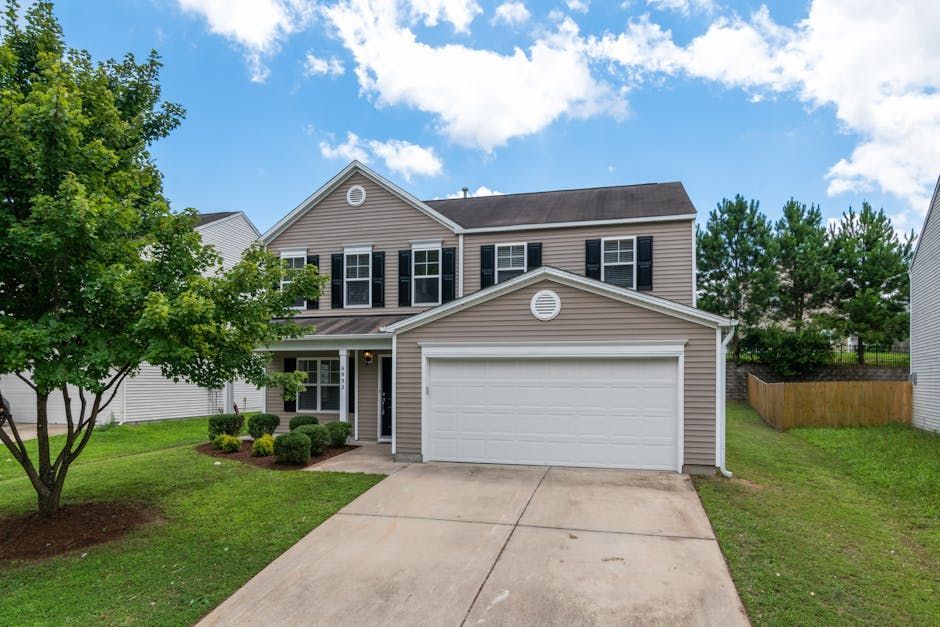Commercial Roofing Companies That Won't Leave You High and Dry

Andre Castro
Owner of Sienna Roofing
Why Finding the Right Commercial Roofing Company Matters More Than Ever
Finding a reliable commercial roofing company can feel overwhelming when your business depends on staying dry and operational. Here's what you need to know:
Key Services to Look For:
- Emergency leak response (24/7 availability)
- Preventive maintenance plans
- Complete roof replacement and re-cover options
- Flat roof installation (TPO, PVC, EPDM systems)
- Metal roof systems and retrofits
- Solar integration and energy upgrades
What Sets Commercial Apart:
- Larger scale projects requiring specialized equipment
- Complex building codes and safety requirements
- Longer service life expectations (20-40 years)
- Multiple roof penetrations for HVAC systems
The commercial roofing industry represents a $50+ billion market with nearly 80,000 contractors nationwide. But size doesn't guarantee quality. The top performers built their reputations on reliability, safety, and results.
Your commercial roof protects more than just a building. It safeguards your inventory, equipment, employees, and business continuity. One leak can shut down operations, damage expensive machinery, or create safety hazards that cost far more than proper roofing.
As Andre Castro, CEO of Sienna Roofing & Solar with over five years of experience working with commercial roofing company projects, I've seen how the right contractor makes all the difference. My background in Construction Management from Texas A&M taught me that commercial roofing success comes down to understanding the unique demands these projects place on both materials and teams.

Why Commercial Roofing Is a Different Beast
When people ask me what makes commercial roofing different, I tell them it's like comparing a neighborhood barbecue to catering a wedding for 500 guests. You're still cooking food, but everything else changes completely.
Working as a commercial roofing company across Sugar Land and the Houston area, we see these differences every day. That innocent-looking flat roof on your office building is actually an engineering marvel dealing with forces and complexities that would surprise most people.
Think about the roof load alone. Your typical commercial building supports massive HVAC units that can weigh as much as a small car. Add solar panels, satellite equipment, and maintenance platforms, and you're talking about tons of equipment sitting on that roof. The entire system has to distribute these loads safely while staying completely watertight around dozens of penetrations.
Then there's the variety of systems we work with. While residential roofs are mostly sloped with familiar materials like shingles, commercial roofs are typically flat or low-slope using specialized membranes. TPO, PVC, and EPDM systems each have their own installation quirks, compatibility requirements, and performance characteristics. The latest research on U.S. roofing industry shows just how specialized this field has become.
The difference becomes crystal clear when you look at a side-by-side comparison:
| Aspect | Residential | Commercial |
|---|---|---|
| Typical Size | 1,500-3,000 sq ft | 10,000-100,000+ sq ft |
| Roof Slope | Steep (4/12 or greater) | Low-slope (0.25/12 to 2/12) |
| Primary Materials | Asphalt shingles, metal | TPO, PVC, EPDM, modified bitumen |
| Equipment Load | Minimal (satellite dish) | Heavy (HVAC units, solar arrays) |
| Penetrations | Few (vents, chimney) | Many (drains, HVAC, electrical) |
| Code Requirements | Basic residential codes | Complex commercial codes |
| Warranty Period | 15-30 years | 10-20 years (higher performance) |
Commercial buildings also deal with large HVAC penetrations that create unique waterproofing challenges. We're not just sealing around a simple vent pipe - we're working around massive ductwork, electrical conduits, and equipment that generates heat and vibration. Each penetration is a potential leak point that requires careful attention to detail.
The variety of roofing types in commercial applications means we need different tools, materials, and expertise for each project. What works perfectly on a retail strip center might be completely wrong for a manufacturing facility or medical office building.
Structural Demands & Building Codes
Here in Texas, Mother Nature doesn't mess around. Wind uplift forces during storms can create suction that literally tries to peel your roof off like opening a can of sardines. Commercial flat roofs are especially vulnerable because they present a large, relatively flat surface to the wind.
The engineering behind wind resistance is fascinating. We have to calculate uplift zones across the entire roof surface, with higher forces at corners and edges. The attachment method - whether mechanical fasteners or full adhesion - has to provide enough holding power to keep everything in place during a hurricane.
Fire ratings add another layer of complexity. Most commercial buildings require Class A fire-rated assemblies, which affects every component from the membrane down to the deck. You can't just swap out one material without considering how it impacts the entire system's fire performance.
Insulation R-values for commercial roofs are typically much higher than residential requirements. While your house might need R-19 to R-38 insulation, commercial buildings often require R-30 or higher to meet energy codes.
Service Life & ROI Expectations
Commercial roofs live in a different world when it comes to performance expectations. These systems are designed for 20-40 year cycles, but unlike residential roofs where a small leak might be tolerated for a while, commercial roof problems need immediate attention.
Life-cycle cost calculations become critical when you're looking at this timeframe. I've seen businesses make the mistake of choosing the cheapest option upfront, only to spend twice as much over 20 years on repairs and early replacement. A quality roof system that performs reliably for decades is almost always the better investment.
Tenant disruption is something residential roofers never have to consider. When we're working on an occupied commercial building, we're coordinating with multiple businesses, maintaining access routes, controlling noise and dust, and often working nights or weekends to minimize impact.
The bottom line? Commercial roofing demands specialized knowledge, equipment, and experience that you simply can't get from a residential contractor trying to scale up. It's why choosing the right commercial roofing company matters so much for your business.
7 Must-Have Services From a Commercial Roofing Company

When your business depends on staying dry and operational, finding the right commercial roofing company becomes critical. After five years of serving commercial clients across Sugar Land, Katy, and Houston, I've learned that not all contractors offer the same level of service.
The difference between a good commercial roofer and a great one often comes down to seven essential capabilities. These services separate contractors who just patch holes from those who truly understand commercial roofing as a business investment. Commercial roofing success depends on finding a contractor who delivers all of these services with the right mix of expertise, safety protocols, and warranty protection.
Emergency Leak Response From a Commercial Roofing Company
Picture this: It's 2 AM on a Sunday, and water is dripping onto your expensive equipment. Your regular contractor's voicemail says they'll get back to you "during business hours." That's when you realize the value of true 24/7 emergency response.
Real emergency service means having trained crews ready to mobilize within hours, not days. When we get an emergency call, our dispatch system immediately identifies the closest available crew and sends them out with the right equipment.
Moisture mapping is crucial during emergency response. What you see as one small leak might actually be water that's traveled through insulation and structural components. We use thermal imaging cameras to trace the full water path and identify hidden moisture that could cause mold or structural damage later.
Our roofing repair expertise means the technician arriving at midnight understands membrane compatibility, structural load paths, and safety protocols.
Preventive Maintenance Plans Only a Commercial Roofing Company Can Deliver
The smartest building owners don't wait for problems - they prevent them. Bi-annual inspections catch small issues before they become major headaches that shut down operations. Our maintenance visits include detailed photographic documentation, so you can see exactly what we found and what we addressed.
Debris removal goes far beyond just cleaning gutters. Commercial roofs collect everything from HVAC condensate to tree branches, and all of it can cause problems. We clear vegetation from membrane seams, remove debris from drains, and ensure proper drainage flow.
Service logs create a valuable performance history for your roof. When replacement time comes or insurance claims arise, having detailed maintenance records can save thousands of dollars.
Roof Replacement & Re-Cover Options
When your commercial roof reaches the end of its service life, you have choices that go beyond simple replacement. Complete tear-off and replacement provides the longest service life and allows for insulation upgrades and structural improvements. However, it's also the most expensive and disruptive option.
Re-cover systems can be installed over existing roofs in good structural condition. This approach reduces disposal costs and installation time while providing excellent performance.
Our commercial roofing replacement approach considers your building's specific needs, budget constraints, and operational requirements to recommend the best solution for your situation.
Flat Roof Installation & Retrofits
Flat roofs dominate commercial construction, but they require specialized expertise that residential roofers simply don't possess. TPO membranes offer excellent chemical resistance and heat-welded seams that create monolithic waterproof barriers. PVC membranes provide superior chemical resistance for buildings with grease exhaust or industrial processes. EPDM rubber membranes offer proven long-term performance with excellent flexibility.
Each membrane type has specific installation requirements. TPO and PVC use hot-air welding to create seams, while EPDM relies on adhesive or tape systems. The fastening method- mechanically attached, fully adhered, or ballasted - affects both performance and cost.
Our flat roof installation expertise ensures your new roof system performs reliably for decades, not just years.
Metal Roof Systems & Retrofits
Metal roofing systems offer exceptional longevity for commercial applications when properly installed. Standing seam systems provide superior weather resistance with concealed fasteners that eliminate potential leak points. The thermal movement of metal roofs requires specialized flashing details and expansion joints that many contractors don't understand.
Retrofit panels can be installed over existing metal roofs to improve energy performance and extend service life. These systems create a new weather barrier while adding insulation value.
Our commercial metal roof replacement services include the structural analysis and system design needed for long-term success.
Solar & Energy-Efficiency Upgrades
Solar integration is becoming standard for commercial roofing projects, and for good reason. Solar-integrated membranes combine waterproofing and energy generation in a single system. Traditional solar panels can be mounted on ballasted systems that don't penetrate the roof membrane.
Cool roof coatings reflect solar heat and reduce cooling costs significantly. White TPO and PVC membranes naturally provide cool roof performance, while dark membranes can be treated with reflective coatings.
Our commercial solar installation requires careful coordination between roofing and electrical work. The roof system must be designed to support solar loads while maintaining waterproof integrity around mounting points.
Innovations & Sustainability Trends to Watch
The commercial roofing world is changing fast, and honestly, it's pretty exciting. As a commercial roofing company serving the Houston area, we're seeing clients ask for systems that do way more than just keep the rain out. They want roofs that save energy, help the environment, and even generate power.
Green roofs are becoming a real game-changer. These living roof systems come in two flavors - extensive green roofs use lightweight soil and tough plants that can handle Texas heat, while intensive green roofs can support bigger plants and create actual outdoor spaces for employees. Both types act like natural insulation, soak up rainwater instead of dumping it into storm drains, and protect the roof membrane from harsh UV rays and temperature swings.
The coolest innovation we're seeing is building-integrated photovoltaics (BIPV). Instead of bolting solar panels on top of your roof, these systems actually replace your roofing materials with solar-generating components. It's like your roof becomes one giant solar panel. The installation costs less, it looks cleaner, and you get the same energy production.
Smart sensors are turning roofs into high-tech monitoring systems. These wireless devices track everything from membrane temperature to moisture levels in real-time. Some systems are so smart they can adjust your building's HVAC based on what's happening on the roof. It's like having a roof that talks to your building's brain.
We're also seeing more recycled materials in commercial roofing. Insulation made from recycled bottles, metal panels from reclaimed steel, and membranes from recycled plastics. These materials often cost less while helping your building's environmental footprint. Scientific research on cool roofs shows these sustainable systems can cut energy use dramatically.
Cool roof standards are becoming the law in many places. These rules require roof surfaces to reflect a certain amount of sunlight and release heat efficiently. It affects which materials you can use, but the energy savings usually pay for any extra costs within a few years.
Energy benchmarking requirements are pushing building owners toward high-performance roof systems. When you have to report your building's energy use publicly, suddenly that roof upgrade becomes a lot more attractive. Smart building owners realize their roof plays a huge role in overall energy performance.
Advanced Materials & Tech
The future is getting pretty wild. Self-healing membranes can actually fix small punctures by themselves - no human required. They're expensive now, but imagine never having to worry about minor roof damage again. It's like having a roof that can heal its own cuts.
Drones have completely changed how we inspect roofs. High-resolution cameras and thermal imaging can spot problems we'd never see from the ground. Plus, drones can safely check dangerous areas without putting our crew at risk. The detailed photos and videos help building owners understand exactly what's happening up there.
AI-powered leak detection is still pretty new, but it's amazing. These systems learn from sensor data and can predict where leaks might happen before any water shows up. It's like having a crystal ball for roof problems. While most contractors aren't using this yet, it's going to transform how we maintain commercial roofs.
Safety, Quality & Compliance Excellence
When choosing a commercial roofing company, look for NRCA certifications. The National Roofing Contractors Association sets the gold standard for installation techniques, safety protocols, and quality control. It shows the contractor is serious about doing things right.
ISO 9001 quality management systems mean the contractor has documented procedures for everything they do. From the first phone call to the final inspection, they follow proven processes that deliver consistent results. It's not just about doing good work - it's about doing good work the same way every time.
Fall protection isn't optional in commercial roofing - it's literally life and death. Proper safety goes way beyond basic harnesses. It includes comprehensive planning, equipment inspections, and OSHA 30-hour training for supervisors. Any contractor working on your roof should treat safety as seriously as the work itself.
Single-source warranties eliminate the headache of dealing with multiple companies when something goes wrong. Instead of the membrane manufacturer blaming the installer and the installer blaming the materials, one warranty covers everything. When problems happen (and they sometimes do), you make one phone call and get one solution.

Frequently Asked Questions About Hiring a Commercial Roofer
How much does a new commercial roof cost per square foot?
The honest answer? It depends on more factors than most people realize. Here in the Houston area, we see commercial roofing company projects ranging from $8-15 per square foot for basic single-ply membrane systems up to $25 per square foot for premium metal roofing with all the bells and whistles.
Material choice drives most of the cost difference. EPDM rubber membranes are your budget-friendly option - they get the job done without breaking the bank. TPO and PVC membranes cost more upfront but deliver better energy efficiency and longer life. Metal roofing systems hit your wallet hardest initially, but they can last 40+ years with proper care.
Don't just look at the sticker price though. A cheaper roof that needs frequent repairs will cost you more in the long run than investing in quality from the start. We've seen clients spend twice as much over 20 years trying to save money with "budget" options.
Smart budgeting means planning for surprises. Add 10-15% to your budget for unexpected issues like structural repairs or code upgrades that pop up once we start tearing things apart. It's better to have the money and not need it than get caught short halfway through the project.
What certifications should my contractor carry?
This is where you separate the pros from the weekend warriors. Your commercial roofing company should have more certifications than a Boy Scout troop leader.
NRCA membership shows they're serious about staying current with industry standards. OSHA 30-hour training should be standard for supervisors, with OSHA 10-hour training for crew members. These aren't just pieces of paper - they represent real knowledge about safety and proper installation techniques.
Manufacturer certifications are huge for warranty coverage. Companies like GAF, Carlisle, and Firestone don't hand out their best warranties to just anyone. Your contractor needs current, active certifications from the manufacturers whose products they're installing on your roof.
The basics matter too: valid business licenses, general liability insurance(at least $1 million), workers' compensation coverage, and performance bonding for larger projects. Don't take their word for it - verify these directly with the insurance companies.
How long will the installation disrupt my operations?
Nobody likes construction disruption, but the reality is that good roofing takes time. A typical 20,000 square foot roof replacement runs 2-3 weeks under perfect conditions. Larger or more complex projects can stretch several months.
Phased work schedules can be a lifesaver for busy commercial buildings. We complete the roof in sections, so most of your building stays operational while work progresses. We'll work with you to identify critical areas that need special scheduling consideration.
Night and weekend work is possible when daytime disruption isn't an option. Fair warning though - it costs more due to overtime rates and lighting requirements. Some operations like hot asphalt work aren't safe to do in the dark, so we'll discuss what's realistic for your specific project.
The key is communication and planning. We pre-stage materials, use quieter methods where possible, and keep everyone informed about work schedules. A little temporary inconvenience beats dealing with leaks and emergency repairs down the road.

Conclusion
Finding the right commercial roofing company isn't about hunting for the cheapest quote - it's about protecting what matters most to your business. Your roof shields everything from expensive equipment to daily operations, and one wrong choice can cost you far more than you'd ever save on a low bid.
The commercial roofing world is huge - we're talking about a $50+ billion industry with nearly 80,000 contractors across the country. But here's the thing: most of those contractors simply don't have what it takes for complex commercial projects. They might be great at residential work, but commercial roofing is a completely different game.
At Sienna Roofing & Solar, we understand that commercial success goes way beyond just knowing how to install a membrane. You need project management skills that keep massive jobs on track, safety protocols that protect workers and your business, and the ability to coordinate complex installations without shutting down your operations.
Our 100% satisfaction guarantee isn't just marketing speak - it's how we sleep at night. When we take on your project, we're not just installing a roof. We're protecting your livelihood, your employees' safety, and your customers' trust. That's why we've built our reputation on getting things right the first time, every time.
Whether you're dealing with a middle-of-the-night emergency leak, planning a major roof replacement, or exploring how solar can slash your energy costs, having the right team makes all the difference. We proudly serve businesses throughout Sugar Land, Missouri City, Katy, Richmond, Pearland, Rosenberg, Rosharon, Friendswood, Webster, Bellaire, and West University with the same community-focused approach that made us a trusted name in residential roofing.
Your commercial roof does more heavy lifting than most people realize. It affects your energy bills, keeps your employees safe and comfortable, and can even impact your property value and insurance rates. Don't gamble with contractors who see it as just another job.
The roofing industry keeps evolving with smarter materials, better technologies, and stricter sustainability requirements. When you partner with a contractor who stays ahead of these changes while maintaining rock-solid quality and safety standards, you're not just solving today's problems - you're setting your business up for decades of reliable performance.
Ready to see what real commercial roofing expertise looks like? Learn more about our commercial roofing services and find how we can turn your roof into a business asset that works as hard as you do.









